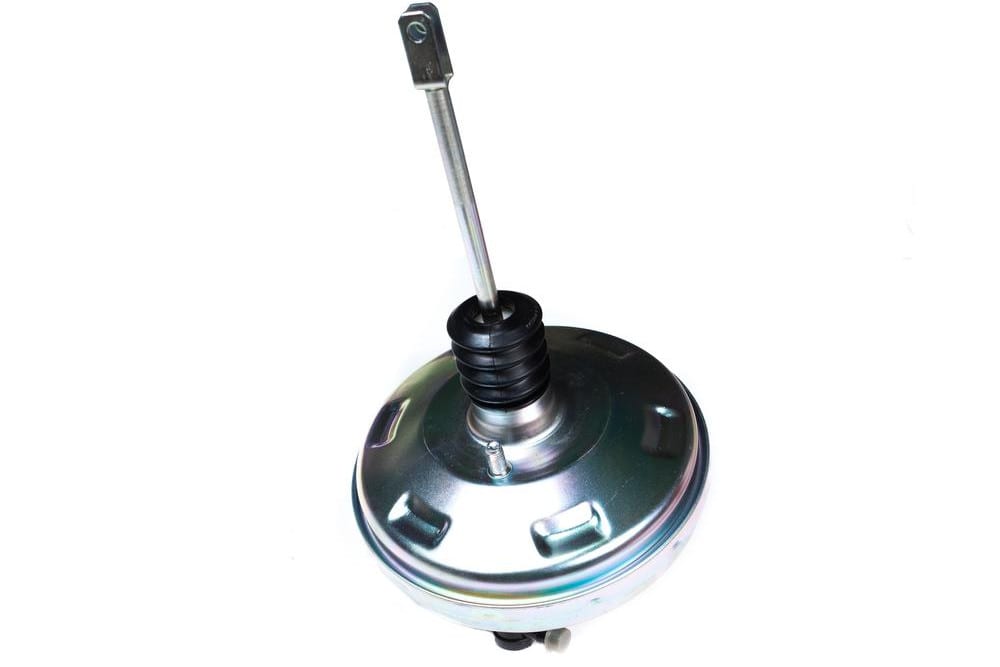

Diesel powered vehicles are typically equipped with a brake booster vacuum pump that applies additional power to the braking system, helping heavier vehicles come to a safe and complete stop. In general, diesel engines generate much less manifold vacuum pressure than a gasoline powered engine. Due to this fact, the secondary vacuum booster is installed by several diesel-powered manufacturers in order to support the brake booster which allows power assisted braking to occur.
The vacuum booster is a huge attribute to improve drivability and safe braking; especially for large diesel trucks. When this mechanical component fails, it typically produces several warning signs that will alert the driver to potential problems. Like many other safety devices, a problem with a failing or broken vacuum booster should not be ignored. If you recognize any of the below symptoms of a bad or failing vacuum booster, contact a ASE certified diesel mechanic, so they can test drive, diagnose and repair this problem as soon as possible.
Here are a few of the warning signs to look for that might indicate a problem with the vacuum booster.
1. Vehicle has a stiff brake pedal
The vacuum booster is designed to provide power to the brake system, allowing the brakes to apply more power through a progressive application. The result of a vacuum booster working correctly is that the brake pedal often feels smooth when applied. However, when the booster is malfunctioning or is broken, the brake pedal will be very stiff and requires the driver to safely apply pressure to the brakes in order to stop the vehicle without locking up the tires.
A damaged vacuum booster can lead to potentially unsafe driving conditions, especially in a heavy diesel powered truck. If you own or drive a diesel powered vehicle and notice that the brake pedal seems stiff, or takes additional time for the vehicle to slow or stop, contact a diesel mechanic as soon as possible as this might be a problem with the brake vacuum booster. If it is, the mechanic can complete the vacuum booster replacement much easier after a test drive and correct diagnosis.
2. Intermittent power to the brakes
The vacuum booster is designed to provide additional power to the brake system, however it does so gradually and produces consistent pressure to the brakes on each wheel. When the booster is not working correctly, the consistency of the brake pedal typically vanishes, producing intermittent power to the brakes. Most brake booster vacuum pumps are electrically powered. Due to this fact, problems with wiring or internal components can cause this intermittent condition to occur. If you notice that power to the brakes on your diesel is intermittent, please contact a diesel mechanic so they can test drive and correctly diagnose the problem. Most of the time this is a problem with a loose wire or electrical short that is causing this problem – but it's better to be safe than sorry.
3. Brakes pedal goes to the floor when applied
This situation can be extremely dangerous. One of the least common symptoms of a vacuum booster failure is if when applied, the brake pedal goes to the floor. This is typically a problem associated with a broken brake line or leaking brake fluid. However, sometimes it can be the result of a vacuum booster that has cracked and is leaking brake fluid from one of the connections. As with any of the above symptoms, a brake pedal that goes down to the floor without applying pressure should be inspected immediately by a certified diesel mechanic.
The brake booster vacuum pump is an important piece of the power brake system, as the power brakes cannot function without the vacuum it supplies. If you suspect that your brake booster vacuum pump may be failing, have the vehicle’s brake system diagnosed by a professional diesel technician. These experts understand diesel engines and the supporting components that help them operate. They will be able to determine if the car needs a brake booster vacuum pump replacement, or make any other repairs if needed.



